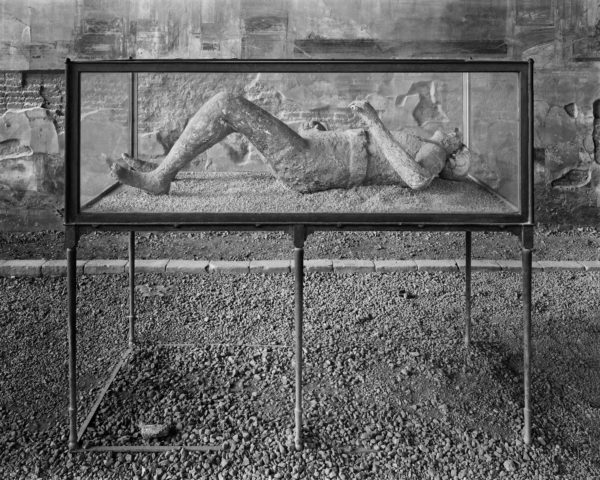Home » Events » Photographic Exhibit Captures Pompeii’s Ongoing History As An Archaeological Site
Photographic Exhibit Captures Pompeii’s Ongoing History As An Archaeological Site
Posted by vrcvanderbilt on Sunday, October 21, 2018 in Events, Fine Arts Gallery, HART, Lectures, News, Vanderbilt University, VRC.
 Destroyed by the eruption of Mount Vesuvius in 79 CE, the ancient city of Pompeii has captured the imagination of the public since it was first excavated in 1748. Pompeii Archive: Recent Photographs by William Wylie, on view in the Vanderbilt Fine Arts Gallery from October 25 through December 6,.features a selection of recent work by artist and photographer William Wylie (American, born 1957) that explores the famous archaeological site. Alongside Wylie’s contemporary photographs are several by Giorgio Sommer (1834-1914), a German photographer who documented the excavation of the site in the mid-nineteenth century. An opening reception will be held on Thursday, October 25, from 5 to 7 pm in Cohen Memorial Hall.
Destroyed by the eruption of Mount Vesuvius in 79 CE, the ancient city of Pompeii has captured the imagination of the public since it was first excavated in 1748. Pompeii Archive: Recent Photographs by William Wylie, on view in the Vanderbilt Fine Arts Gallery from October 25 through December 6,.features a selection of recent work by artist and photographer William Wylie (American, born 1957) that explores the famous archaeological site. Alongside Wylie’s contemporary photographs are several by Giorgio Sommer (1834-1914), a German photographer who documented the excavation of the site in the mid-nineteenth century. An opening reception will be held on Thursday, October 25, from 5 to 7 pm in Cohen Memorial Hall.
Wylie’s interest in the contemporary state of Pompeii began with his discovery of Sommer’s work. An avid historian, Wylie, professor of art, University of Virginia, was especially intrigued with Sommer’s strategic use of photography to flatten the picture plane and create layered and stratified images evocative of the archaeological process. “For me, much of the mystery of Pompeii lies in the site’s layers,” said Wylie. “Archaeologists work by uncovering and studying the deposits of past eras, but even visitors experience the site in this way. I was motivated to try and make photographs that revealed some of Pompeii’s complexity, the way multiple pasts intersect there with our 21st-century present.”
The exhibition features eighteen large-scale photographs focused on the ongoing process of restoration, discovery and collection of archival remains and materials from the eruption of Mount Vesuvius in 79 CE. Through Wylie’s photographs, Pompeii is seen as a constantly changing—not static—archaeological site. Photographing on analog black and white film with an 8 x 10 large-format camera, the artist creates highly detailed images that evoke Sommer’s nineteenth-century oeuvre and the transitions that continue to mark the site and landscape in the 21st century. Ever curious as to how landscapes accumulate visual markers and meanings, Wylie notes in his artist statement that “change is inescapable at Pompeii. . . .I document the changing relationships between artifacts, ruins, spaces, and the passage of time.”
His working method incorporates repeated visits to a site; an immersion in which he gains an understanding of both the cultural and natural landscapes that create place. For the ongoing Pompeii project, Wylie traveled extensively to the archeological site, gradually building friendships and the trust of site supervisors and archivists, and gaining access to areas of the site and storage facilities not available to the general public.
This ongoing research, and the body of work that has resulted, was supported by Yale University’s Doran Artist in Residency awards at the Sol and Carol LeWitt estate in Praiano, Italy, where Wylie was a resident in 2012 and 2015.
Pompeii Archive: Recent Photographs by William Wylie, organized by the Gregory Allicar Museum of Art at Colorado State University, is brought to the Vanderbilt University Fine Arts Gallery, in part, through the generous support of the Program in Classical and Mediterranean Studies, with additional support provided by the Department of History of Art and the Department of Art.
The Fine Arts Gallery is located in Cohen Memorial Hall at 1220 21st Avenue South on the Peabody College campus. Gallery hours are from 11 am to 4 pm Monday through Friday, and from 1 to 5 pm weekends. Parking is available in all non-reserved spaces in Lot 95 near Cohen Hall on the Peabody campus.
§
In conjunction with the Fine Arts Gallery exhibit, Wylie will deliver a lecture, “The Possibility of Ruins: A Pompeii Archive,” on Wednesday, November 14, at 4:10 pm in 203 Cohen Memorial Hall. Free and open to the public, his lecture is made possible by the Program in Classical and Mediterranean Studies.
*William Wylie. Body cast, Macellum (VII.9.7), Pompeii,” 2015, archival pigment print, 37 x 45 inches

©2026 Vanderbilt University ·
Site Development: University Web Communications